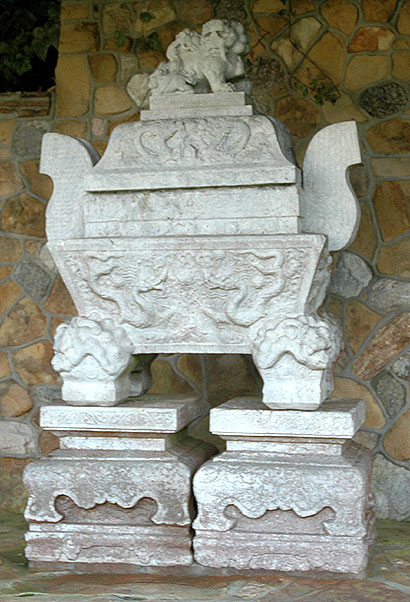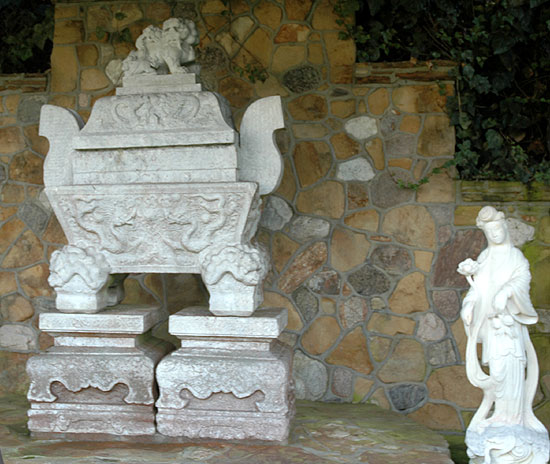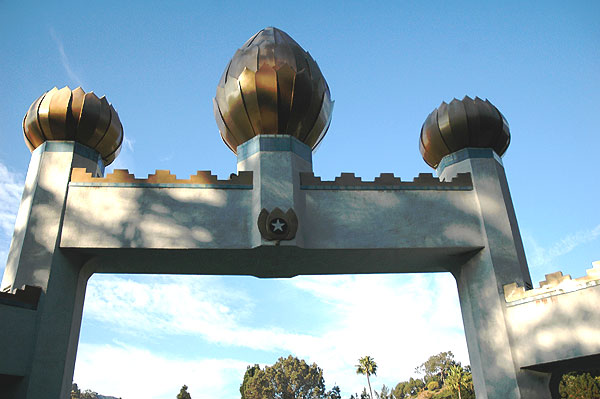Topic: Couldn't be so...
| The End of Thanksgiving |
Here in the states we had our Thanksgiving - everyone ate too much, the kids ran around screaming and laughing on the sugar high after pumpkin pie and this and that, and earlier in the day, as is traditional, the Detroit Lions lost the football game that no one watched (it just seemed to on in the background). Someone might have watched the Macy's parade in Manhattan- it seems it rained.
In Iraq, other things were happening -
This has the smell of the end of the noble ideal - tossing out an awful government and introducing a new way of life, a western-style secular liberal democracy with an unregulated free-market economy where entrepreneurs would thrive and everyone would get along, and get rich. It wasn't a bad idea, but like everyone in the world learning Esperanto or everyone in American having a flying car to get around, it wasn't workable. Those who pointed that out were ridiculed, and still are ridiculed - that's just thinking small and not having the courage to try the impossible. Now these faint-hearted folks aren't saying "I told you so" as much as they are just depressed. Those in charge of everything are still thinking big.So as Thursday began, Sunni Arab guerrillas surrounded and attacked the Ministry of Health, which is dominated by followers of Shiite cleric Muqtada al-Sadr. The guerrillas trapped 2,000 employees in the compound and threatened to kill any who came outside. They also subjected the building to mortar fire. The ministry guards, who are probably Mahdi Army, kept them at bay but lost 7 men doing it. It took US and Iraqi forces 2 hours to respond, and the guerrillas were only finally dispersed by helicopter gunships. The siege probably came in revenge for the Mahdi Army attack on the Sunni-run Ministry of Higher Education two weeks ago.
Then US troops searching for a kidnapped US soldier in Sadr City were approached by van traveling at a high speed, which did not slow as they instructed it. They shot up the van, killing 4 civilians and creating some unhappy families in Sadr City; then this incident was overshadowed by several big attacks.
Steven R. Hurst of the Associated Press reported that the death toll in the string of car bombings targeting Sadr City and other Shiite neighborhoods on Thursday has risen to 161, with 257 wounded. Altogether, he says, "Counting those killed in Sadr City, at least 233 people died or were found dead across Iraq on Thursday." Oh, my. Since Iraq is 11 times smaller in population than the US, that would be like the deaths of 2,563 Americans. On September 11, on the order of 2,783 Americans were killed, and several hundred of other nationalities.
Armed Shiites came into the streets amid the charred and bloody corpses, says al-Hayat, cursing Sunni Muslims and firing their automatic weapons in the air in frustration and rage. They were taking mortar fire. The footage from Sadr City on Aljazeera looked like the seventh level of hell, with vehicles burning, the air thick with smoke, and mortar shells and small arms fire boiling in the background.
KarbalaNews.net reports in Arabic that after the car bombs were detonated in Sadr City, the Sunni Arab guerrillas set up checkpoints and attacked ambulances and rescue crews, stopping further ambulances from getting through. The Sunni Arab guerrillas also surrounded hospitals near to Sadr City and prevented cars bearing the wounded from getting through, firing on them.
The Iraqi government imposed a curfew on Baghdad and closed the Baghdad and Basra airports, cutting the country off from the outside worlds. Al-Hayat reports in Arabic that Basra ports were also closed "until further notice."
But when the Shiite Ministry of Health is under siege in response to the hundreds blown to bits earlier at the Sunni-run Ministry of Higher Education, something is wrong. Imagine the National Institute of Health with its quiet grounds in Bethesda being surrounded and shot up by armed forces angry that someone blew up the Federal Department of Education downtown. Add both sides blocking ambulances to the hospitals of the "other side" - and firing on the paramedics as they slip on body parts trying to find someone relatively intact to save. Washington is a nasty place with some bad neighborhoods and a sadly high crime rate, but it's not like this. Still it's not civil war there - or so we're told.
And no one watches the news on Thanksgiving Day. The administration can be thankful for that. And the Christmas shopping season kicked off the next day - Black Friday. Some stores opened at midnight, others at dawn, the every route everywhere was jammed by the middle of the morning - another day when the news was not on anyone's mind.
Black Friday of course will edge any number of low-margin business just into the black for the year. That's how it got its name. The day can keep you in business, or sink you. It's important.
Black Friday in Iraq seemed to mean something else - "Revenge-seeking militiamen seized six Sunnis as they left Friday prayers and burned them alive with kerosene in a savage new twist to the brutality shaking the Iraqi capital a day after suspected Sunni insurgents killed 215 people in Baghdad's main Shiite district." It should be noted the six Sunni worshippers were doused with kerosene and burned alive "as Iraqi soldiers stood by." There are Iraqi soldiers of this sort and of that sort. These were the wrong sort of the unlucky six - they were Shiite or Kurd guys. They saw no reason to stop this.
What to make of it all? Don Surber argues here that the Democrats big win in the midterm elections here in the states is the real reason for the new chaos in Iraq. They saw we're not serious about bringing peace to Iraq - we tossed out the stern Republicans and elected the wimp Democrats - so they cut loose. This would have never happened if Americans voted the other way. They'd know better. They'd be good, as they'd understand getting out of line would get them slapped down by the young American guys in the sunglasses and body armor. Now they know we're not serious. That's what's really going on.
One wonders if they really care who was elected in Idaho. You can file that under "interesting theory - not provable either way." On the right it's no doubt moving into "conventional wisdom."
The real mystery, of course, is whether Vice President Cheney visited Baghdad on Thanksgiving. No one knows. If he did, perhaps the visit didn't go well. We'll never know.
And the air was full of hindsight and worry. Over in the UK, Boris Johnson, an MP for Henley, seems to have stirred awake - "No quantity of troops could have prevented this catastrophe; and the dreadful thing is that I think Saddam knew it."
So now he decides this? Well, yes -
Oh, that.It was the moment I should have twigged. It was the moment I should have realised that I had voted for the biggest British military fiasco since the Second World War. I was wandering around Baghdad, about 10 days after Iraq had been "liberated", and it seemed to me that the place was not entirely without hope.
OK, so the gunfire popped round every corner like popcorn on a stove, and civil society had broken down so badly that the looters were taking the very copper from the electricity cables in the streets. But I was able to stroll without a flak jacket and eat shoarma and chips in the restaurants.
With no protection except for Isaac, my interpreter, I went to the Iraqi foreign ministry, and found the place deserted. The windows were broken, and every piece of computer equipment had been looted. As I was staring at the fire-blackened walls a Humvee came through the gates. A pair of large GIs got out and asked me my business. I explained that I was representing the people of South Oxfordshire and Her Majesty's Daily Telegraph.
That didn't cut much ice. Then I noticed a figure begin to unpack his giraffe-like limbs from the shady interior of the Humvee. He was one of those quiet Americans that you sometimes meet in odd places.
He was grizzled and in his mid-50s and with a lantern jaw, and unlike every other US soldier I'd met he had neither his name nor his blood group stitched on his person. I grasped at once that this quiet American was no soldier. He had that Brahmin air, a bit Ivy League, a touch of JK Galbraith. Yes, folks, he was some kind of spook.
I remember how he walked slowly towards the shattered foreign ministry building, stroking his chin. Then he walked back towards us, and posed a remarkable question. "Have you, uh, seen anyone here?" he asked.
Nope, we said. All quiet here, we said. Quiet as the grave.
"Uhuh," he said, and started to get back in the Humvee. And then I blurted my own question: "But who are you?" I asked. "Oh, let's just say I work for the US government," he sighed. "I was just wondering if anyone was going to show up for work," he said. "That's all."
And that, of course, was the beginning of the disaster. Nobody came to work that day, or the next, or the one after that, because we failed to understand what our intervention would do to Iraqi society. We failed to anticipate that in taking out Saddam, we would also remove government and order and authority from Iraq.
As he says, it is now commonplace for people like him, who supported the war, to say that we "did the right thing" but that it had mysteriously "turned out wrong." Now he sees this is "intellectually vacuous." (He's British, after all.) And more troops won't help. What are they supposed to do?
Of course one thing they need there is doctors, but they're all leaving, and according to one doctor, the "hospitals look more like barns" - so what's the point?
Richard Clarke makes the case that "It's time to admit it's over."
That's pretty clear -
And he knocks down the arguments for staying, like the "sink cost" one - we must honor the American dead by staying until we can build something worthy of their sacrifice. It doesn't work in business, and it doesn't work in Vegas - "what is gone is gone, and what is left we should conserve, cherish and employ wisely." But it does feel bad.Americans tend to think we can achieve almost any goal if we just expend more resources and try a bit harder. That spirit has built the greatest nation in history, but it may be dooming Iraq.
As the head of the British army recently noted, the very presence of large numbers of foreign combat troops is the source of much of the violence and instability. Our efforts, then, are merely postponing the day when Iraqis find their way to something approaching normalcy. Only withdrawal offers a realistic path forward.
But if we leave now there'd be chaos. Here's it's "not so fast" -
How did that old Fram oil filter commercial go? "You can pay me now or you can pay me later." You're going to pay.The flaw lies not in the concept that chaos will happen, but rather in thinking that chaos would only happen if we withdraw in the near-term. Chaos will almost certainly follow any U.S. withdrawal, whether in 2008 or 2012.
Even granting that chaos after a 2008 pullout may be worse than what would follow a 2012 withdrawal, is the difference between those two levels of disaster worth the cost? This cost comes in American dead and wounded, Iraqi dead and wounded, billions of dollars in military expenditures, the continued damage to U.S. influence in the world, and the further strengthening of radical Islamist terrorists everywhere.
But al-Qaeda will be emboldened by our departure, and we cannot have that. Yeah, but "Al-Qaeda is already sufficiently emboldened." What's the difference? And that's followed by a draw-down plan you can follow at the link. It's what many have suggested.
None of it matters -
But everyone knows who's to blame, and it's not the newly elected Democrats. And this is a real war in Iraq, not some Greek tragedy where a flimsy contraption is lowered form the ceiling and an actor aboard speaks in his god-voice and makes everything all better. That's not what's coming down.President Bush insists on staying in Iraq, and it is easy to understand why. In "The March of Folly" (Ballantine, 1985), Barbara Tuchman documented repeated instances when leaders persisted in disastrous policies well after they knew that success was no longer an available outcome. They did so because the personal consequences of admitting failure would be very high. So they postponed the disastrous end to their policy adventures, hoping for a deus ex machine or to eventually shift the blame.
As for what is coming down, note this exchange between Matthews on "Hardball" and retired Major General John Batiste -
Ah, it's the General Sherman thing. Kill them all and let God sort it out.Matthews: This proposal for beginning a withdrawal within 4 to 6 months, what would that be in terms of policy? Would that make any difference to anything or is that just a political move?
Batiste: I think it's a political move. Chris, I think we're fighting a protracted war against the jihadists, and these people mean business. They have as a stated objective the destruction of our way of life. We got off to a terrible start in Iraq, a strategy that was fundamentally flawed, that opened up Pandora's box, that unleashed hell, and now we've got to get this thing under control quickly.
Matthews: Are we fighting jihadists in Iraq?
Batiste: Exactly.
Matthews: Are we?
Batiste: This is important, Chris. This group, this movement is after us, big time. We need to stop this.
Matthews: We have the Shi'a militia, we have the Sunni insurgents, and we have al Qaeda terrorists in that country. Which group is associated, or is part of this jihad?
Batiste: Clearly the al Qaeda, that foreign influence in Iraq, that has as their stated objective the destruction of our way of life, and my point is, we need to take this very, very seriously. To simply leave Iraq, to set timelines without conditions, set us up to fail big time in the future.
Matthews: The troops we have over there, 140,000 of them, what percent of our troops, what chunk of them are fighting jihadists, and what percent are fighting militias on the side of the government we're putting in there, and what percent are fighting Sunnis who are upset because they're losing out on the loss of power since Saddam fell?
Batiste: To the troops on the ground, it really doesn't matter; they're all the same.
Matthews does press it - "Well, help us. What should we do in Iraq? Who should we be shooting at and fighting at, and who should we be defending? What side should we be on in Iraq? Tell us what's going on over there. What should we be doing?"
But he doesn't get much of an answer, other than this is serious, and we need funding - maybe a war tax. The Army and the Marine Corps need resources.
Matthews - "I think you'd be more successful with that argument, General, if you would tell me who we're fighting in Iraq right now, and why should we be fighting them, and who should we be fighting for in Iraq?"
He doesn't really get an answer, other than we need to fight on. It's important.
And then it gets interesting -
It doesn't? This is very curious. You don't deal with a problem by breaking it down, looking at all the parts, and seeing what you're dealing with? You just stand firm? It's a good thing the general is doing talk shows in his retirement, and didn't open an auto repair shop.Matthews: General, the problem from my perspective, watching this, and you're the expert, the military man, we're reporting on numbers every day, coming out of Iraq, something like 3,700 Iraqis killed by other Iraqis, the Shi'a militia going after Sunni, the Sunni insurgents going after Shi'a - they're killing each other. If that's the case, that Muslim is killing Muslim, how can you describe it as some jihad against the West?
Batiste: That's exactly what it is. Chris, inside Iraq, we're fighting a multi-faceted enemy, but make no mistake about it: we're fighting the jihadists. What do you think the attack on 9/11 was?
Matthews: Wait a minute, let's talk about Iraq. The Iraqis are killing each other, General, every day, over 120 a day on average this month, 3,700 Iraqis being killed each month, by Iraqis; how can you define that as an anti-Western war?
Batiste: It's all part of it, and it's exactly why we need -
Matthews: How so? Just explain how an Iraqi killing another Iraqi is an attack on the West.
Batiste: It's a mix of multi-faceted enemies that are coming at us, and part of it is a civil war - no question about it - but it's why we need a new, dramatic strategy on the ground in Iraq now, to solve this problem.
Matthews: Who are we going to be shooting? Who do we shoot?
Batiste: It's why we need leadership that can explain all this to the American people. We need to stand up —
Matthews: Stand up against whom?
Batiste: It doesn't matter.
Maybe it doesn't matter. Alexander Cockburn argues we're not really controlling event in Iraq -
So basically America is not controlling events in Iraq. If the Shia choose to cut supply lines from Kuwait up to the northern part of the country, the US forces would be in deep, deep trouble. The problem is that there is a precedent.Imagine a steer in the stockyards hollering to his fellows, "We need a phased withdrawal from the slaughterhouse, starting in four to six months. The timetable should not be overly rigid. But there should be no more equivocation." Back and forth among the steers the debate meanders on. Some say, "To withdraw now" would be to "display weakness". Others talk about a carrot and stick approach. Then the men come out with electric prods and shock them up the chute.
The way you end a slaughter is by no longer feeding it. Every general, either American or British, with the guts to speak honestly over the past couple of years has said the same thing: the foreign occupation of Iraq by American and British troops is feeding the violence.
Iraq is not on the "edge of civil war". It is in the midst of it. There is no Iraqi government. There are Sunni militias and Shi'a militias inflicting savagery on each other in the awful spiral of reprisal killings familiar from Northern Ireland and Lebanon in the 1970s. Iraq has become Chechnya, headed into that abyss from the day the US invaded in 2003. It's been a steep price to inflict on the Iraqi people for the pleasure of seeing Saddam Hussein die abruptly at the end of a rope.
If the US is scheduled for any role, beyond swift withdrawal, it certainly won't be as "honest broker", lecturing fractious sectarians on how to behave properly, like Teacher in some schoolhouse on the prairie. It was always been in the US interest to curb the possibility of the Shi'a controlling much of Iraq, including most of the oil. By one miscalculation after another, precisely that specter is fast becoming a reality. For months outgoing ambassador Zalmay Khalilzad tried to improve the Sunni position, and it is clear enough that in its covert operations the US has been in touch with the Sunni resistance.
If some Sunni substitute for Saddam stepped up to the plate the US would welcome him and propel him into power, but it is too late for such a course. As Henry Kissinger said earlier this week, the war is lost. This is the man who - if we are to believe Bob Woodward's latest narrative - has been advising Bush and Cheney that there could be no more Vietnams, that the war in Iraq could not be lost without humiliating consequences for America's status as the number # 1 bully on the block. When Kissinger says a war is lost, you can reckon that it is.
What to do? Dave Lindorff argues that the first thing Democrats should do in January is to rescind the 2001 Authorization to Use Military Force (AUMF) that was nothing but trouble -
Yeah, yeah - no one is impeaching anyone. But it is over -The first thing Democrats need to do when they walk into the Senate and House chambers this January is to vote out a joint resolution repealing the September 18, 2001 Authorization for Use of Military Force (AUMF), which was the authorization for the U.S. attack Al Qaeda forces and the Taliban government of Afghanistan.
That AUMF has been used, wholly inappropriately and wantonly, by President Bush as the justification for his assault on the US Constitution, for his willful violation of laws domestic and international, and for his unconstitutional usurpation of legislative and judicial power.
The president has claimed that the AUMF, far from simply being an authorization to go to war against Afghanistan and against the Al Qaeda organization there, was an open-ended authorization for him to initiate an unending "War on Terror," which he has subsequently claimed has no boundaries, and will be fought around the globe and within the U.S.
Bush has further claimed, without a shred of Constitutional authority, that this AUMF makes him commander in chief in that never-ending global conflict, and that as commander in chief, he is not bound by either law or Constitution. It is this spurious and sweeping claim of dictatorial power that the president has used to justify his signing statements, which he has used to render inoperative in whole or in part some 850 or more acts passed by Congress since 9-11. It is this same claim that the president has used to justify his deliberate violation of the 1978 Foreign Intelligence Surveillance Act - a felony and violation of the Fourth Amendment.
It is likewise this AUMF that he has used to justify his authorization of torture, kidnapping and detention without charge, his refusal to answer legitimate requests for information from Congress and the 9-11 commission, and his ignoring of direct orders from the federal courts.
All of these actions by the president are manifestly unconstitutional, and cry out for his impeachment. (The Constitution clearly defines and limits the president's commander in chief role to simply making him the senior officer of the military, not a generalissimo. Furthermore, as Barbara Olshanski and I explain in our book "The Case for Impeachment," the AUMF never gave Bush any authority at all to conduct war inside the U.S. (In fact, Tom Daschle, who as a Democratic Senator from South Dakota was the Senate Majority Leader at the time the AUMF was passed, specifically denied a last-minute request from the White House to have the words "in the United States" inserted into the wording of the resolution authorization.)
That's a thought. And GlobalSecurity.org's John Pike thinks the Bush administration will use the AUMF to bomb Iran before the end of 2007. (See the first interview in Part 2, here). But he said that in Canada, so that may be wrong. Still, better safe than sorry. It can be rescinded. It won't be, of course. We'll be told we'll all die if the "tool" is taken away. Sigh.Afghanistan is no longer a war. The U.S. is simply contributing military assets to a NATO action in that country at the request of the elected government in Kabul. Such an action requires no AUMF. Meanwhile, the prevention of terror is clearly an intelligence and police issue, not a war.
It too does not require an AUMF.
A simple majority vote of House and Senate would put the U.S. Constitution back in place, and would restore the balance of power between executive, legislative and judicial branches.
But all the news got buried in the Thanksgiving holiday. Somewhere in there, that Russian spy died, the one who was digging up dirt Russian President Vladimir Putin - "The bastards got me." Putin condemned the fellow's deathbed statement as a "provocation." If Ann Coulter suggested that the same should happen to Justice Stevens, as she once hoped, it didn't make the news. Everyone was eating turkey then shopping, and Lebanon fell apart after the assassination of the anti-Syrian minister Pierre Gemayel. Too much news is too much news.
Posted by Alan at 22:09 PST
|
Post Comment |
Permalink
Updated: Friday, 24 November 2006 22:38 PST
home




 Rather than an entry on politics and the war, a visit to the Mahatma Gandhi World Peace Memorial, and the "wall-less temple" erected in his honor. The memorial is a thousand-year-old stone sarcophagus from China, in which a portion of Gandhi's ashes are encased in a brass and silver coffer.
Rather than an entry on politics and the war, a visit to the Mahatma Gandhi World Peace Memorial, and the "wall-less temple" erected in his honor. The memorial is a thousand-year-old stone sarcophagus from China, in which a portion of Gandhi's ashes are encased in a brass and silver coffer. 



